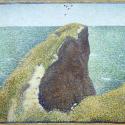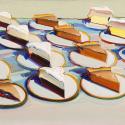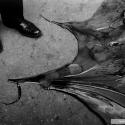Ashes is a two-part exhibition. The darkened gallery at 3 Duke Street, St James’s is filled with the onscreen image of a young black man sitting on the prow of a small boat with his back to us (main picture). He turns occasionally to smile to camera; he stands up and balances precariously as the boat bobs up and down on the swell; he falls overboard, climbs back on and stands silhouetted against the blue sky, grinning down at us.
With his lithe young body, bleached dreadlocks and disarming smile he seems very amiable and laid back; it's impossible to imagine him in any sort of trouble. And with the bright blue sky, gentle breeze and sound of the waves pounding on the beach, the setting is like paradise, a place where life is easy and time drifts happily by.
But the soundtrack tells a different story. A man recounts how, while out fishing, his friend Ashes found a stash of drugs on the beach of a nearby island and decided to snaffle them. Inevitably, the dealers come looking for him and gun him down; end of story.
Why is this simple tale so arresting? The answer lies in the contrast between, on the one hand, the idyllic setting and the beauty and apparent innocence of the main protagonist (supposedly Ashes, but probably an actor) and, on the other, the brutal reality of the murder. Shot in Grenada, the film juxtaposes the holiday brochure image of the Caribbean as a tourist haven for fun-loving Americans and the view from other side – a lack of opportunity and the fatalism engendered by limited horizons.
 Broken Column (pictured) stands resplendent in the gallery at No. 11. Like the many broken columns gracing monuments and Victorian cemeteries, it symbolises a life cut short; rather than being carved from white marble, though, it is cut from black Zimbabwean granite and polished to a high sheen. Instead of a stone plinth, it stands on a wooden pallet, as though it has just been shipped in and will soon be moving on – a mobile memorial to a descendent of someone ripped from their African homeland for transport into slavery.
Broken Column (pictured) stands resplendent in the gallery at No. 11. Like the many broken columns gracing monuments and Victorian cemeteries, it symbolises a life cut short; rather than being carved from white marble, though, it is cut from black Zimbabwean granite and polished to a high sheen. Instead of a stone plinth, it stands on a wooden pallet, as though it has just been shipped in and will soon be moving on – a mobile memorial to a descendent of someone ripped from their African homeland for transport into slavery.
To modern eyes, Victorian gravestones seem irredeemably kitsch; and there’s something fundamentally ridiculous about erecting a marble tombstone to a feckless opportunist, no matter how charming. So is McQueen’s memorial ironic? The answer I suspect is both "yes" and "no". The absurdity of this pompous prick is exactly the point. On the one hand, it is a (serious) memorial to all those whose lives are blighted by poor prospects while, on the other, it asks us to question whom we deem worthy of commemoration and why.
As someone who has been showered with honours – McQueen is the recipient of an OBE and a CBE, not to mention the awards his films Hunger, Shame and 12 Years a Slave have won – it would not be surprising if questions like these were on his mind.












![SEX MONEY RACE RELIGION [2016] by Gilbert and George. Installation shot of Gilbert & George 21ST CENTURY PICTURES Hayward Gallery](/sites/default/files/styles/thumbnail_125_x_125_/public/mastimages/Gilbert%20%26%20George_%2021ST%20CENTURY%20PICTURES.%20SEX%20MONEY%20RACE%20RELIGION%20%5B2016%5D.%20Photo_%20Mark%20Blower.%20Courtesy%20of%20the%20Gilbert%20%26%20George%20and%20the%20Hayward%20Gallery._0.jpg?itok=3oW-Y84i)


Add comment